So all in close array, helmet touching helmet and shield touching shield, like a moving wall of shining bronze, the men of Achilles charged, and Patroclus, in the chariot led the way. Down they came at full speed on the flank of the Trojans, who saw the leader, and knew the bright armour and the horses of the terrible Achilles, and thought that he had returned to the war. Then each Trojan looked round to see by what way he could escape, and when men do that in battle they soon run by the way they have chosen. Patroclus rushed to the ship of Protesilaus, and slew the leader of the Trojans there, and drove them out, and quenched the fire; while they of Troy drew back from the ships, and Aias and the other unwounded Greek princes leaped among them, smiting with sword and spear. Well did Hector know that the break in the battle had come again; but even so he stood, and did what he might, while the Trojans were driven back in disorder across the ditch, where the poles of many chariots were broken and the horses fled loose across the plain.
The horses of Achilles cleared the ditch, and Patroclus drove them between the Trojans and the wall of their own town, slaying many men, and, chief of all, Sarpedon, king of the Lycians; and round the body of Sarpedon the Trojans rallied under Hector, and the fight swayed this way and that, and there was such a noise of spears and swords smiting shields and helmets as when many woodcutters fell trees in a glen of the hills. At last the Trojans gave way, and the Greeks stripped the armour from the body of brave Sarpedon; but men say that Sleep and Death, like two winged angels, bore his body away to his own country. Now Patroclus forgot how Achilles had told him not to pursue the Trojans across the plain, but to return when he had driven them from the ships. On he raced, slaying as he went, even till he reached the foot of the wall of Troy. Thrice he tried to climb it, but thrice he fell back.
Hector was in his chariot in the gateway, and he bade his squire lash his horses into the war, and struck at no other man, great or small, but drove straight against Patroclus, who stood and threw a heavy stone at Hector; which missed him, but killed his charioteer. Then Patroclus leaped on the charioteer to strip his armour, but Hector stood over the body, grasping it by the head, while Patroclus dragged at the feet, and spears and arrows flew in clouds around the fallen man. At last, towards sunset, the Greeks drew him out of the war, and Patroclus thrice charged into the thick of the Trojans. But the helmet of Achilles was loosened in the fight, and fell from the head of Patroclus, and he was wounded from behind, and Hector, in front, drove his spear clean through his body. With his last breath Patroclus prophesied: “Death stands near thee, Hector, at the hands of noble Achilles.” But Automedon was driving back the swift horses, carrying to Achilles the news that his dearest friend was slain.




